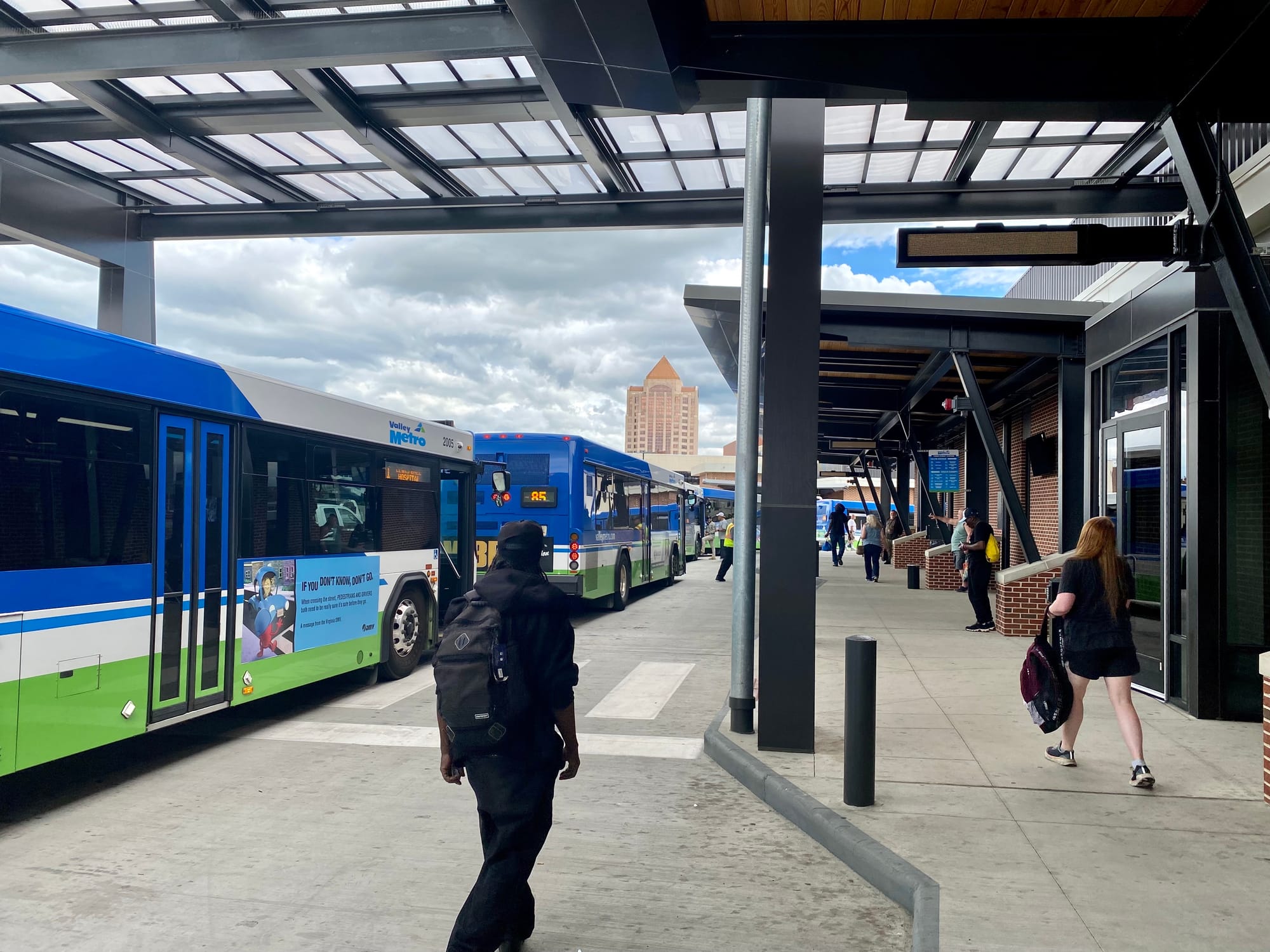Consultant Hired to Probe Roanoke Bus Company's Operations After Audit Issues
AECOM is taking a thorough look at the bus system after audits showed finance issues.

Roanoke’s veteran bus system operator is under review after the company struggled with financial duties two years in a row.
One possible outcome of the review could be historic: a new management contractor to operate Valley Metro, the government funded bus service. Only three firms have run Valley Metro since it opened 1975, all related by corporate combinations.
For now, French-owned Transdev Services Inc. is in the driver’s seat at Valley Metro.
But it could become a hot seat.
The city hired the top-ranked, global consulting firm AECOM to find the strengths and weakness of Valley Metro under the stewardship of Transdev and compare its performance to industry standards, according to a document recently obtained by The Roanoke Rambler under a Freedom of Information Act request.
Ridership is coming back from a pandemic-time drop, and Valley Metro has moved into a new bus station and expanded services. But there have been issues. An auditor released negative findings about Transdev’s management of bus-system finances in 2024 — a report that echoed previous adverse findings about 2023 spending.
AECOM presented its plan to the city in a 24-page proposal that identified those audit lapses as a chief concern. “We understand that audit findings have recurred in more than one year, and that management has not been responsive in effectively addressing the issues raised,” AECOM wrote.
Transdev, whose U.S. operations are based in Illinois, did not respond to a request for comment on AECOM’s assertion.
Andrew Keen, a Roanoke bus board member with finance experience, said by email that Transdev struggled with its money-related duties due to understaffing. There is a national shortage of government finance officers, he said, a point confirmed by reports from the Government Finance Officers Association in Chicago.
“While certain audit findings are a concern,” said Keen, who is Vinton’s finance director and treasurer, “I believe it’s important to highlight first that there were no instances of employee mal-intent and secondly that the organization has made headway in both its staffing woes and its understanding of government grants. While there is certainly room to improve, progress is steadily being made.”
In addition to diving into finances, AECOM will size up whether other management models might work better than the current one, in which the private sector company with unionized employees fully operates the city-owned service for local governments.
Depending on the outcome of those evaluations, AECOM said it could guide the city and its bus board through the process of rebidding the operation of Valley Metro to any interested firm in the transit management arena. The bus board is a panel of appointees who oversee Valley Metro for the local government agencies that pay for it.
The city hired AECOM to evaluate Valley Metro in November, according to the documents. The work cost $78,820 and was estimated to take eight months.
With the review underway in the background, municipal officials sent Transdev a letter in March telling the company it had been rehired for at least another year. In light of its contract extension, Transdev’s monthly compensation will rise 2.5 percent to $32,112. Transdev provides top executives, employs drivers and mechanics and oversees system operation, among other duties.
City officials this spring could have gone a different route and solicited bids from other transit management companies instead of renewing. Mayor Joe Cobb said the bus board considered rebidding the contract. The decision to stick with Transdev was made in consultation with officers and staff, who concluded it was “the best viable option at the time.”
Two firms in addition to Transdev — Keolis and MV Transportation — provide transit management services in Virginia, according to spokeswoman Jayla Parker with the Virginia Department of Rail and Public Transportation. State officials do not, however, know for certain “whether Roanoke had alternatives” to Transdev, she added. In replying to a reporter’s question about transit management companies, state officials didn’t study Roanoke’s contract terms or evaluate whether Keolis and MV would have made an effort to meet them, Parker said.
Neither Boston-based Keolis nor Texas-based MV responded to an email request for comment.
Also known as the Greater Roanoke Transit Co., Valley Metro provides essential transportation to jobs, shopping and appointments to people in the city, Salem and Vinton who are by and large low-income and lack vehicles. A few thousand people catch rides daily.
Valley Metro’s first operator was ATE Management and Service, which ran it from inception in 1975 until the late 1980s. First Transit bought ATE and ran Valley Metro until 2023, at which time Transdev bought First Transit.
Bus board members five years ago solicited outside proposals to see whether any other firm was interested in the responsibility of running Valley Metro. No firm other than the incumbent — First Transit at the time — bid. The city contracted with First Transit for five more years under an agreement that would have ended June 30 but for the recent extension.
If local leaders ultimately decide to solicit new proposals later this year, AECOM would contact transit management companies that might be interested and invite them to bid, a step designed to give local leaders choices about who runs Valley Metro into the future.
Kevin Price, Valley Metro's general manager and a Transdev employee, released a statement in response to questions about the situation.
“We remain committed to building on the momentum of GRTC’s recent accomplishments, including the construction of the award-winning Third Street Station, the launch of the VMGO real-time transit information application, a newly enhanced website, the full replacement of the Valley Metro bus fleet without the use of local funds, the MetroFLX service extension project, and the introduction of all-electric buses to the fleet. We value our partnership and remain focused on delivering high-quality transit solutions to the community.”

